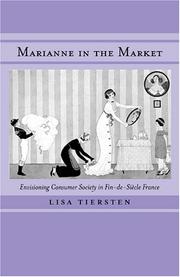| Listing 1 - 1 of 1 |
Sort by
|

ISBN: 0520225295 0520925653 9786612356353 1282356356 1597347353 9780520925656 9781597347358 9780520225299 9781282356351 Year: 2001 Publisher: Berkeley : University of California Press,
Abstract | Keywords | Export | Availability | Bookmark
 Loading...
Loading...Choose an application
- Reference Manager
- EndNote
- RefWorks (Direct export to RefWorks)
In the late nineteenth century, controversy over the social ramifications of the emerging consumer marketplace beset the industrialized nations of the West. In France, various commentators expressed concern that rampant commercialization threatened the republican ideal of civic-mindedness as well as the French reputation for good taste. The female bourgeois consumer was a particularly charged figure because she represented consumption run amok. Critics feared that the marketplace compromised her morality and aesthetic discernment, with dire repercussions for domestic life and public order. Marianne in the Market traces debates about the woman consumer to examine the complex encounter between the market and the republic in nineteenth-century France. It explores how agents of capitalism-advertisers, department store managers, fashion journalists, self-styled taste experts-addressed fears of consumerism through the forging of an aesthetics of the marketplace: a "marketplace modernism." In so doing, they constructed an image of the bourgeois woman as the solution to the problem of unrestrained, individualized, and irrational consumption. Commercial professionals used taste to civilize the market and to produce consumers who would preserve the French aesthetic patrimony. Tasteful consumption legitimized women's presence in the urban public and reconciled their roles as consumers with their domestic and civic responsibilities. A fascinating case study, Marianne in the Market builds on a wide range of sources such as the feminine press, decorating handbooks, exposition reports, advertising materials, novels, and etiquette books. Lisa Tiersten draws on these materials to make the compelling argument that market professionals used the allure of aesthetically informed consumerism to promote new models of the female consumer and the market in keeping with Republican ideals.
Women consumers --- Consumption (Economics) --- Middle class --- Aesthetics, Modern --- Consommatrices --- Consommation (Economie politique) --- Bourgeoisie --- Esthétique moderne --- History --- Histoire --- France --- Economic conditions --- Civilization --- Conditions économiques --- Civilisation --- 19th century. --- Consumption (Economics). --- Consumption (Economics) - France - History - 19th century. --- France. --- History. --- Middle class. --- Middle class - France - History - 19th century. --- Women consumers. --- Women consumers-- France-- History-- 19th century. --- Business & Economics --- Economic History --- Esthétique moderne --- Conditions économiques --- Aesthetics --- Commons (Social order) --- Middle classes --- Consumer demand --- Consumer spending --- Consumerism --- Spending, Consumer --- Women as consumers --- Social conditions --- Social classes --- Demand (Economic theory) --- Consumers --- E-books --- advertising. --- aesthetics. --- bourgeoisie. --- capitalism. --- commercialization. --- consumer culture. --- department stores. --- domesticity. --- economics. --- etiquette books. --- fashion. --- female bourgeois. --- female consumer. --- female morality. --- france. --- french culture. --- french republic. --- french women. --- gender roles. --- gender studies. --- gender. --- good taste. --- la belle epoque. --- nonfiction. --- republican. --- women. --- womens studies.
| Listing 1 - 1 of 1 |
Sort by
|

 Search
Search Feedback
Feedback About
About Help
Help News
News